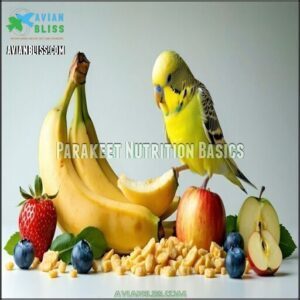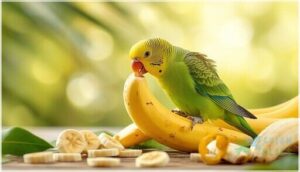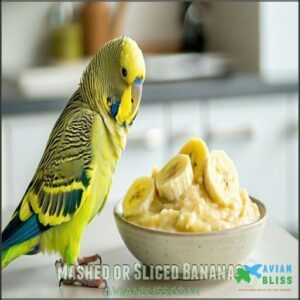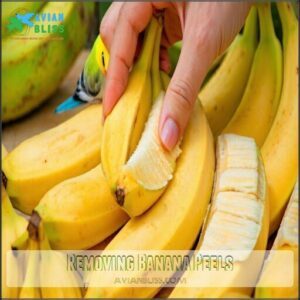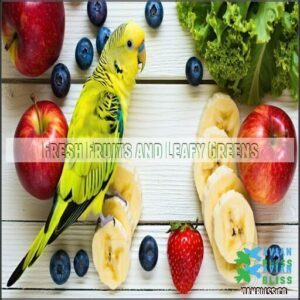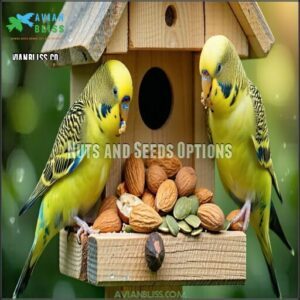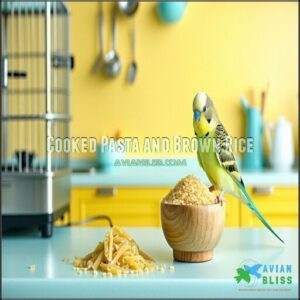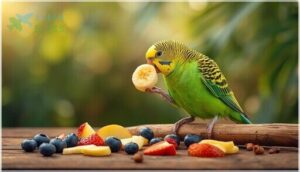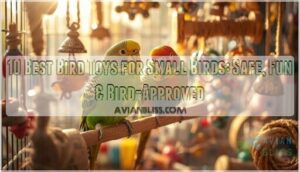This site is supported by our readers. We may earn a commission, at no cost to you, if you purchase through links.

Bananas are packed with essential nutrients like potassium and vitamin B6, which can support your bird’s overall health.
But don’t go overboard—bananas are high in sugar, so they’re best served as an occasional treat rather than a daily snack.
Slice them into small, manageable pieces, and skip the peel since it may contain pesticides.
Always watch for any signs of overfeeding, like weight gain or unusual behavior, to maintain a balanced diet that keeps your feathered friend chirping happily.
Curious about other safe treats? Let’s explore!
Table Of Contents
- Key Takeaways
- Parakeet Nutrition Basics
- Can Parakeets Eat Bananas
- Benefits of Bananas
- Risks of Feeding Bananas
- Preparing Bananas for Parakeets
- Safe Foods for Parakeets
- Feeding Bananas Safely
- Frequently Asked Questions (FAQs)
- Can parakeets eat bananas?
- Are bananas suitable for someone with Type 2 Diabetes?
- Can parakeets eat fruits?
- Are Cavendish bananas good for parakeets?
- Can parakeets eat peanut butter?
- Can parakeets eat pears?
- Can I feed bananas to my parakeet daily?
- Are bananas safe for parakeets?
- How much banana should I give to my parakeet?
- Can I feed my parakeet other fruits besides bananas?
- Conclusion
Key Takeaways
- Bananas are safe for parakeets and provide nutrients like potassium and vitamin B6, but only offer them in moderation to avoid sugar-related health issues.
- Always remove the peel before feeding bananas to your parakeet, as it may contain pesticides and pose choking risks.
- Stick to small, thumbnail-sized pieces and serve bananas as an occasional treat, no more than 1-2 times a week.
- Balance your parakeet’s diet with a mix of pellets, fresh vegetables, and other safe fruits to maintain proper nutrition and health.
Parakeet Nutrition Basics
You’ll need to provide your feathered friend with a balanced diet of 60-70% high-quality pellets and 30-40% fresh fruits and vegetables to guarantee proper nutrition.
Your parakeet also requires essential vitamins and minerals from varied food sources, including a calcium supplement like cuttlebone to support healthy development and prevent nutritional deficiencies.
Importance of Balanced Diet
Your parakeet’s health hinges on a balanced diet that prevents nutrient deficiencies and supports overall wellbeing.
A varied food approach guarantees your feathered friend receives all essential nutrients for peak health.
- Fresh water must be available at all times
- A calcium source like cuttlebone is essential for bone health
- Different food textures prevent boredom and encourage natural foraging
- Seasonal fruits and vegetables provide changing nutritional profiles
Don’t limit their menu—variety is your parakeet’s pathway to vibrant health!
Role of Pellets and Fresh Foods
Building on proper nutrition foundations, let’s look at how daily food choices affect your feathered friend’s wellbeing.
Quality pellets form the cornerstone of a healthy parakeet diet, providing consistent nutrition that seeds alone can’t deliver.
For ideal parakeet health, aim for a mix of 60-70% high-quality pellets with 30-40% fresh foods.
- **Always introduce new foods gradually, placing small portions near favorite feeding spots to encourage exploration.
Fresh vegetables, limited fruits, and occasional treats create food variety that prevents boredom while supporting health.
When preparing fruit for birds like bananas, remember that portion control matters—small amounts prevent obesity while still providing enjoyment.
Vitamins and Minerals for Parakeets
When caring for your feathered friend, vitamins and minerals play a vital role in their overall health.
Your parakeet needs specific nutrients to thrive – without them, vitamin deficiencies can develop quickly.
Nutrient Benefits Food Sources
Think of these nutrients as your bird’s tiny health insurance policy!
Proper parakeet nutrition prevents common issues like weak bones and poor feather quality.
Birds also need vitamins to maintain vibrant feather growth.
While pellets provide a foundation, supplementation needs vary based on your bird’s age and activity level.
Remember – calcium sources are especially important for breeding hens, while vitamins support your parakeet’s immune system and vibrant plumage.
Can Parakeets Eat Bananas
Yes, your parakeets can safely enjoy bananas as part of their diet. These sweet treats are nutritionally valuable when offered correctly. Stick with ripe yellow Cavendish bananas—your feathered friends will appreciate their soft texture and sweetness.
Practice proper portion control by offering tiny, beak-sized pieces (about thumbnail size) just once or twice weekly. Always remove the peel completely to prevent choking hazards.
Monitor your bird’s digestion after introducing this new treat. Some parakeets may show excitement for banana day, while others need time to adjust to this fruit. Like other fruits, bananas should only comprise 10-15% of their diet.
Remember, bananas complement—not replace—their regular pellet-based diet.
Benefits of Bananas
You’ll find that bananas pack a nutritional punch for your feathered friend, offering essential vitamins like B6 and C, along with potassium that supports muscle health.
They’ll also enjoy a natural energy boost from the carbohydrates and fiber, which helps with digestion and prevents constipation in your parakeet, providing a natural energy boost.
Energy and Growth Boost
Like a tiny feathered athlete, your parakeet gains substantial energy benefits from bananas. The natural carbohydrates deliver a controlled sugar rush that fuels playful activity.
When offered in moderation, bananas provide:
- Quick-releasing carbs that transform into immediate energy
- Growth factors supporting healthy development
- Dietary impact that enhances overall nutrition
- Natural sugars that combat fatigue during active periods
Just remember—limit servings to thumbnail-sized pieces twice weekly for ideal benefits without weight concerns, ensuring your parakeet receives the energy benefits.
Rich in Essential Vitamins
Beyond energizing your parakeet, bananas pack a vitamin punch that supports their overall health.
They’re loaded with Vitamin B6 for proper brain function and potassium benefits that maintain healthy muscle activity.
Your feathered friend will also get a manganese boost for metabolism and folate sources essential for cell development.
Nutrient Benefit
Remember, moderation makes perfect parakeet food!
Supports Healthy Development
Beyond the vitamin profile we’ve explored, bananas offer thorough support for your parakeet’s healthy development.
The potassium helps maintain proper muscle function, while vitamin B6 promotes brain development and neurological health.
These nutrients work together to support tissue growth and cell function throughout your bird’s body.
Bananas also provide a gentle immunity boost through antioxidants and vitamin C, while contributing to metabolic support.
When included as occasional treats in your parakeet’s fruit diet, these banana benefits help create the nutritional foundation for a thriving, active bird.
Risks of Feeding Bananas
You’ll need to watch out for the risks when feeding bananas to your feathered friend, as their high sugar content can lead to obesity and digestive problems if offered too frequently.
Parakeets with existing kidney or liver issues should avoid bananas altogether, as excessive potassium might worsen their condition.
High Sugar Content Risks
In spite of their nutritional benefits, bananas pack a sugary punch that can spell trouble for your parakeet’s health.
When fed excessively, these sweet treats can trigger blood sugar imbalances and disrupt your bird’s natural energy levels.
- Too much sugar can promote bacterial overgrowth in your parakeet’s digestive system, leading to uncomfortable digestive issues and potential metabolic disorders over time.
Watch for signs of picky eating when introducing bananas, as their sweetness might make your bird reject healthier foods. Moderation is key—this prevents calorie overload while protecting your parakeet’s liver and kidney health.
Overfeeding and Obesity
Five major concerns arise when overfeeding bananas to your parakeets.
These high-calorie treats can quickly lead to obesity when portion control isn’t properly managed.
Your bird’s tiny frame doesn’t require many calories daily, making banana’s sugar content potentially problematic.
Watch for signs of weight gain like decreased mobility or heavy breathing – these are classic indicators of recognizing obesity in parakeets.
The health consequences can include shortened lifespan and joint problems.
Calorie Control
Impact on Kidney Disease
How exactly do bananas affect parakeets with kidney disease?
In terms of renal function, bananas present genuine concerns:
- Potassium overload can stress damaged kidneys, disrupting phosphate levels
- Excessive uric acid production may occur from sugar metabolism
- Hydration importance increases as kidneys struggle to process high-potassium foods
- Compromised renal function requires careful selection of parakeet treats
If your feathered friend has kidney issues, skip bananas completely.
Instead, offer safe fruits with lower potassium content. A potential risk involves organ damage from calcification due to imbalances.
Always consult your vet about bird nutrition when managing kidney disease, as potassium overload and excessive uric acid production can be particularly problematic, and understanding the importance of hydration is crucial for maintaining renal function.
Preparing Bananas for Parakeets
You’ll need to prepare bananas properly before offering them to your feathered friend, removing the peel completely and cutting the fruit into small, beak-sized pieces.
Washing the banana thoroughly and serving it fresh will guarantee your parakeet enjoys this sweet treat safely while avoiding any potential digestive issues, ensuring they have a safe experience.
Fresh or Frozen Bananas
After discussing the risks of overfeeding bananas, let’s look at how you can offer them in fresh or frozen form.
Fresh bananas are convenient and easy to serve, but they spoil quickly. Consider freezing small, bite-sized pieces as a cooling treat for your parakeet, especially during warmer months.
When freezing, slice ripe bananas into tiny portions and store in an airtight container. Always thaw frozen pieces completely before feeding.
You can find banana-related products online. Your parakeet may show preference for either form, but both retain similar nutritional benefits while extending your healthy snack options.
Mashed or Sliced Bananas
Preparing mashed or sliced bananas for your parakeet doesn’t need to be complicated. Choose ripe bananas that are soft but not browning for ideal nutrition and taste. Your feathered friend will appreciate either preparation method based on their preference.
- Mashed texture works best for younger birds or those new to trying bananas
- Sliced portioning should be thumbnail-sized (about 3-5 tiny pieces weekly)
- Ripeness considerations matter – yellow with minimal spots offers perfect sweetness
Always follow proper hygiene practices when preparing fruit for parakeets. Remember that feeding frequency matters – bananas should remain an occasional treat rather than a dietary staple. For a balanced diet, consider high-quality pellet options.
Removing Banana Peels
After cutting your banana into bite-sized pieces, always remove the peels before offering them to your parakeet.
Banana peels pose several risks that many bird owners overlook, including Pesticide Concerns and Choking Hazards.
| Risk Factor | Concern | Solution |
|---|---|---|
| Pesticide Concerns | Chemical residues even on organic peels | Complete peel removal |
| Peel Digestibility | Can cause digestive blockages | Serve only the soft inner fruit |
| Choking Hazards | Stringy phloem bundles in peels | Make certain thorough peel removal |
For proper parakeet care, discard peels rather than leaving them in the cage, as what’s harmless to us might be among toxic foods for your feathered friend, emphasizing the importance of complete peel removal.
Safe Foods for Parakeets
You’ll find a variety of safe foods to keep your parakeet happy and healthy beyond just bananas.
Fresh fruits like apples and berries, leafy greens, and small amounts of nuts, seeds, and even cooked pasta can create a well-rounded diet for your feathered friend, including options like bananas.
Fresh Fruits and Leafy Greens
After preparing those banana treats, let’s explore other fresh foods your parakeet will love!
Your feathered friend thrives with a variety of fruits and leafy greens in their diet.
Parakeets can safely enjoy:
- Apples (seeds removed) and berries – perfect bite-sized treats
- Leafy greens like kale, spinach, and romaine – nutrition powerhouses
- Melons and pears – hydrating options for hot days
Offer these fresh foods in small serving sizes alongside their regular diet.
Consider additional safe options for variety. Remember, organic options minimize pesticide exposure!
Nuts and Seeds Options
Parakeets love a good crunch, and safe nuts and seeds make perfect healthy snacks.
Offer seed variety like millet, sunflower, or pumpkin seeds, which pack energy and nutrients. For nuts, almonds and walnuts are excellent choices, but use sparingly—they’re calorie-dense.
Stick to raw, unsalted options, and always clean them well. Consider purchasing safe nuts from reputable vendors.
Proper serving sizes matter; a pinch is plenty for your Budgerigar. Rotate these treats to keep your pet bird happy and nutritionally balanced!
Cooked Pasta and Brown Rice
Cooked grains like pasta and brown rice make excellent bird treats when prepared simply.
They’re a fun way to mix up your pet bird’s diet while adding variety and nutrition. Keep it plain—no salt, butter, or oil—and serve in tiny portions.
- Whole-grain pasta: Chop into bite-sized pieces for easy eating.
- Brown rice: Fully cook, then cool before serving.
- Rice benefits: Try quinoa or barley as healthy snacks.
- Preparation methods: Always serve grains plain and cooled.
Pasta nutrition and rice benefits can support dietary balance in your parakeet’s avian care routine!
Feeding Bananas Safely
Feeding bananas to your parakeet is safe when done in moderation and with proper preparation.
Make sure to offer small, clean pieces and keep an eye on their health to avoid any issues, it is safe when done correctly.
Limiting Banana Consumption
Bananas are a delightful, occasional treat for parakeets, but moderation is key.
Stick to portion control by offering 3-5 small slices twice a week to avoid sugar overload. Overindulgence can lead to health issues like obesity or picky eating.
Here’s a quick guide:
| Aspect | Do | Don’t |
|---|---|---|
| Frequency | Twice a week | Daily feeding |
| Portion Size | 3-5 small slices | Entire banana |
| Alternatives | Apples, berries, leafy greens | Processed fruits |
Mix in alternative treats to keep their diet balanced, and always remove uneaten fruit to prevent spoilage.
Monitoring Parakeet Health
Keeping tabs on your parakeet’s health is a must when feeding bananas. Small changes can signal big issues, so stay observant.
Here’s what to watch for:
- Dropping analysis – Loose or discolored droppings may mean dietary adjustments are needed.
- Feather plucking or dull feathers – This could point to stress or poor nutrition.
- Behavioral changes – Low activity levels or unusual weight fluctuations might require a vet visit.
A happy parakeet is active, with shiny feathers and a curious attitude. Regular checks keep your bird’s health and diet on track!
Avoiding Pesticides and Toxins
A little care goes a long way in keeping your feathered friend safe from harmful pesticides. Washing bananas thoroughly under running water helps remove pesticide residues.
If you can, go for organic produce—it’s a safer bet for avoiding toxin exposure. Non-organic bananas are fine too, but only after a good scrub.
Peel concerns? Skip feeding banana peels altogether since they tend to hold most of the chemicals. Stick to the fruit itself for safe handling.
Organic fruit minimizes risks, but variety is key—don’t let bananas hog the spotlight. Your parakeet will thank you for a clean, balanced diet free of pesticide worries!
Frequently Asked Questions (FAQs)
Can parakeets eat bananas?
Yes, parakeets can eat bananas.
They’re a tasty, nutrient-packed treat when given in moderation.
Just slice them into tiny pieces, avoid the peel, and offer once or twice a week to keep things balanced.
Are bananas suitable for someone with Type 2 Diabetes?
You can enjoy bananas with Type 2 Diabetes, but stick to small portions.
Their natural sugars can raise blood sugar levels, so pair them with protein or healthy fats to balance the impact.
Can parakeets eat fruits?
Fruits are like dessert for parakeets—they can enjoy them, but in moderation.
Offer safe options like berries, apples, or melons.
Avoid overfeeding sugary fruits to prevent health issues.
Always wash and cut them first!
Are Cavendish bananas good for parakeets?
Cavendish bananas are great for parakeets when offered in moderation.
Their soft texture makes them easy to eat, and they’re packed with potassium and vitamin C.
Just stick to small portions to avoid sugar overload!
Can parakeets eat peanut butter?
Parakeets can eat peanut butter, but only in tiny amounts and occasionally.
Choose unsalted, sugar-free varieties without additives.
Spread a thin layer on a toy or treat stick to keep it fun and safe!
Can parakeets eat pears?
Yes, parakeets can eat pears.
Just remove the seeds and cut the pear into small, bite-sized pieces.
Offer it occasionally as a treat, and watch for any signs of digestive upset afterward.
Can I feed bananas to my parakeet daily?
Feeding bananas daily to your parakeet is like giving them dessert every night—too much of a good thing.
Stick to small pieces 1-2 times a week to avoid sugar overload and health issues.
Are bananas safe for parakeets?
Bananas are perfectly safe for parakeets when given in moderation.
Their nutrients, like potassium and vitamin B6, offer health benefits.
Just stick to small pieces occasionally, and avoid peels to prevent digestive issues, with moderation being key.
How much banana should I give to my parakeet?
Give your parakeet 1-2 small banana pieces, about the size of your thumbnail, once or twice a week.
Too much can lead to weight gain, so keep it as an occasional treat.
Can I feed my parakeet other fruits besides bananas?
Your parakeet can enjoy fruits like apples, berries, melons, and pears too!
Just avoid pits, seeds, and overfeeding.
A little variety keeps them happy and healthy—think of it as their own fruit salad adventure!
Conclusion
Did you know that bananas make up about 10% of the average fruit diet for many pet birds?
While parakeets can eat bananas and benefit from their nutrients, moderation is key.
Too much sugar can lead to weight gain or health issues.
Stick to small, occasional servings, and always remove the peel to avoid pesticides.
By balancing bananas with other safe foods, you’ll keep your parakeet healthy, happy, and chirping with joy!
- https://www.reddit.com/r/budgies/comments/nkxtzk/can_parakeet_eat_bananas/
- https://pangovet.com/pet-health-wellness/birds/can-parakeets-eat-bananas/
- https://www.omlet.us/guide/parakeets/parakeet_food/fresh_food/
- https://exoticdirect.co.uk/news/what-do-parakeets-eat/
- https://www.britannica.com/plant/Cavendish-banana

